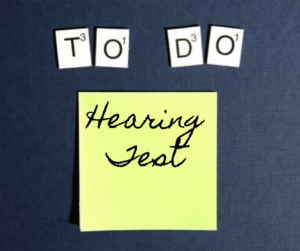
Gone
are the days when hearing
loss
is just for old people.
To be
perfectly honest, it really never was just
for old folks, but people perceived it to be. In modern times, we recognize
that hearing impairments can affect individuals of any age, not just the elderly.
So, that brings up a good question. If hearing loss can affect any individual at any point in their life, how often should you get your hearing checked to make sure it hasn’t hit YOU?
The
answer to this question really depends on your age.
Hearing testing for infants and toddlers
In the
United States, newborn
hearing testing is an important part of a baby’s first checkup
and is completed before she even leaves the hospital. This is a great way to
detect cases of genetic
hearing loss or a hearing impairment present at birth.
Following
this initial test, many children are not tested again until they reach school
age. If a toddler does not seem to be developing appropriately or adequately
responding to auditory stimuli, however, an interim hearing evaluation may be
warranted.
Hearing tests for school-age children
As
with many of the other senses, hearing plays a big role in how well children
learn in school. That’s why most children undergo hearing testing when they
first enter school (age 5 or 6) and periodically throughout their school years.
The most common subsequent intervals are around age 10 (middle school) and at
least once during high school. If the child changes schools, that institution
may require new testing, especially if current hearing test records are not
available for the student.
Hearing evaluation in adulthood
While
many individuals begin to have at least partial hearing loss after age 50, it
can actually start much earlier than that but not be noticeable because it’s so
gradual. In general, the American
Speech-Language-Hearing Association advises adults to get a
hearing test every 10 years until they turn 50. After that, the interval
shortens to every 3 years.
Risk factors for hearing loss change the
schedule
Of
course, not every person is the same and individual environments can create
additional risk factors for hearing loss. These include, but are not limited to:
- Occupational
exposure to loud noise or chemicals
that can cause hearing loss - Presence
of other health conditions with hearing loss as a side effect - Use of
ototoxic medications - Excessive
earwax buildup - Unhealthy
lifestyle factors that affect hearing, such as smoking or not
exercising
If any of these risk factors are present, it may be a good idea to have your hearing checked on a more frequent schedule. If in doubt, or if you experience any changes in hearing, schedule an appointment with an audiologist for a thorough evaluation. In many cases, early detection of hearing impairments makes treatment more successful and can lead to a higher quality of life. Your hearing is too precious to leave unnoticed!

The post How Often Should You Get Your Hearing Checked? appeared first on Hear Well – Live Well.
Source: Hear Well-Live Well Blog

